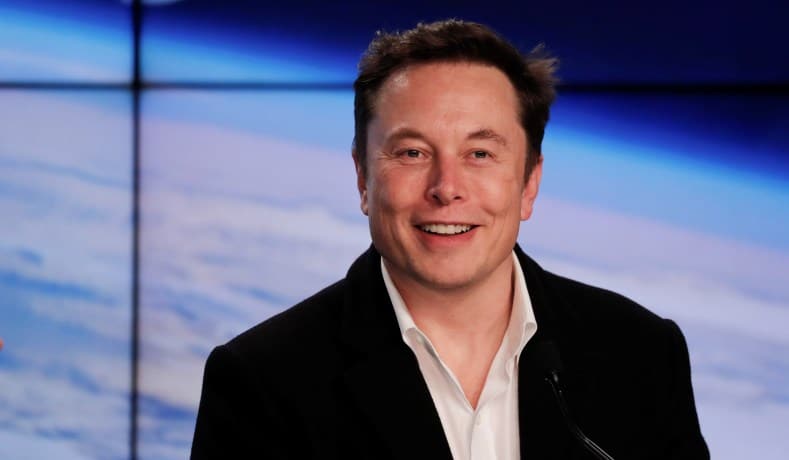Table of Contents
Elon Musk, Tesla’s CEO, was recently frustrated with Delaware. A court ruling nullified his 2018 compensation deal, potentially worth $55.8 billion. Musk was dissatisfied. Chancery Court Judge Kathleen McCormick found that Musk had improperly influenced the board and shareholders to secure approval for such compensation. This decision denied Musk what could have been the largest ever CEO pay package. As a result, he has begun to question whether it is right to consider the state an “incorporation haven.” Musk may be upset. This is thanks to its business-friendly legal system. 
Musk’s Response And The Prospects Of Moving
In reaction to the court’s decision, Musk ran a poll on X (Formerly Twitter) asking whether Tesla should move its incorporation from Delaware to Texas, where they have their operational headquarters. This resulted in a majority voting for relocation, hence making Musk announce plans to have a shareholder vote on the same. Some critics see this as his retaliation towards Delaware due to the case against his unprecedented package offer. A package endorsed by a significant 80% of Tesla’s shareholders got turned down. This set the stage for discussions around shareholder democracy, a key aspect of free-market beliefs.
Musk and His Relationship with Public Votes and Business Choices
Sometimes, Musk uses social media votes to help make decisions for the company. Other times, he doesn’t. In 2021, he sold Tesla shares based on a poll result. A big impending tax bill from his stock options probably influenced this action. Despite another poll favoring Tesla’s acceptance of dogecoin, Musk paused. He was likely worried about the coin’s inconsistent value and how it might affect Tesla’s financial health. Despite this, Tesla started taking dogecoin for merchandise sales, a small part of its income.
Analyzing Musks’ view on Delaware Incorporation
Elon Musk’s dissatisfaction with the legal decision made by Delaware is understandable, especially considering the high stakes involved in his compensation package; however, one cannot forget about long established image of the state as an environment where businesses feel at home. Most Fortune 500 companies prefer Delaware’s legal infrastructure because it supports and safeguards organizations. Musk’s criticism and subsequent actions indicate the conflict between individual corporate experiences and broader benefits for incorporated businesses in Delaware. Hence, the outcome of this dispute and a possible move by Tesla will add to the ongoing debate on where best to incorporate and govern companies.

The Catalyst for Musk’s Displeasure with Delaware
Elon Musk’s disappointment with Delaware began after a major legal ruling saw his 2018 pay package invalidated that could have been worth $55.8 billion. This judgment has significant implications that could impact future compensation negotiations involving Musk and cost him billions over time. This misfortune and Musk’s earlier statement that he would not create AI technology at Tesla unless it had controlling equity, illustrate his complicated relationship with Delaware’s legal system. Even though Musk is good at tackling legal difficulties, this decision stirred reactions. His followers even nicknamed him “Teflon” Musk.
Disputes and Victories in Musk’s Career
In his role as CEO of Tesla, Musk faced many disputes and court fights. Notably, he won a case about Tesla buying SolarCity. He also won a defamation case started by British caver Vernon Unsworth, who Musk called a “pedo guy” on Twitter. Besides, Musk tackled suits from shareholders about his tweet hinting at taking Tesla private. Musk showed his power out of court by restarting Tesla’s Fremont factory during COVID-19 and moving Tesla’s main office to Texas due to California’s strict regulations.
Delaware continues to be the go-to place for starting a business, hosting more business entities than its population. A remarkable fact is that over half of all US publicly listed firms and two-thirds of Fortune 500 businesses choose Delaware.
Here are the compelling reasons why corporations gravitate toward this state:
- Simplified incorporation: Delaware has a quick process of setting up a business that sometimes takes an hour to complete.
- Tax benefits: No state income tax for non-Delaware businesses formed there.
- Judicial assistance: The Delaware Court of Chancery is dedicated to corporate law and provides experienced legal support, though it ruled against Musk on his pay dispute.
- Flexible and Business-friendly Laws: Even if Musk did not appreciate it, Delaware is one of the most pro-business states in America.
- Privacy: Directors and officers of Delaware corporations can keep their information away from public knowledge.
- Venture Capital and Private Equity Preference: Due to its legal framework, investment opportunities exist, making Delaware an attractive destination for startups looking for funds.
Delaware’s business-friendly laws and tax incentives have continued to attract a wide array of companies despite being ranked higher than many corporate taxes with about 1.5 million incorporated businesses.
Elon Musk versus Delaware and the Quest for New Incorporation Paradises
However, Elon Musk did not hesitate to let everyone know what he thought about this particular state, especially after his 2018 Tesla compensation plan was invalidated by a court ruling that may significantly impact his future financial status or well-being. It has also set off a wider debate on whether companies should be incorporated in Delaware or in some other states. The latter would mean moving the incorporation of Tesla from its present location in California, where it is headquartered – a step that appears to betray Musk’s disappointment. However, this move raises concerns over how Tesla’s governance and shareholder interests will fare under new conditions.

Evaluating Other States for Incorporation
However, some states like Nevada, Wyoming, and Texas are emerging as alternatives to Delaware due to their business-friendly legal environment, even though Delaware has long been the preferred state by over half of all public companies in the US, including two-thirds of Fortune 500 companies. These states also have their respective advantages, such as no state income taxes and the recent establishment of a business court similar to Delaware’s Court of Chancery in Texas. However, Elon Musk seems more offended than making business decisions against Delaware on this particular subject.
Industry Perspectives on Musk’s Stance
Some people from the business and legal communities have mixed views about what Musk said concerning Delaware. Danilo Kawasaki of Gerber Kawasaki Wealth and Investment Management expressed reservations about how Tesla’s corporate governance would be affected by Musk’s unilateral decision-making. Similarly, Brian Cheffins, a professor of corporate law at Cambridge University, questions whether Texas can provide this ‘business friendly’ legal environment that Musk desires because he emphasizes on the subtle but existing benefits associated with using Delaware’s incorporation system.
The Highlights of Delaware Incorporation
Nonetheless, Musk does not like that Delaware has a simple and streamlined incorporation process. It also offers tax benefits for non-domestic companies. Additionally, Delaware has a court (Court of Chancery) especially dealing with business law. The state provides specialized legal support and confidentiality for its directors. Furthermore, venture capitalists and private equity investors hold a high opinion of the legal framework in Delaware. This appeals to start-ups in need of capital. These qualities make the state incomparable as an incorporation venue. This makes an important contribution to corporate evolution and creativity.
Debating on the Best Location to Incorporate
When weighing such matters, consider whether to incorporate in Delaware or any other state, such as Nevada, Texas, or Wyoming. Consider tax implications, investor preferences, and assistance from the legal system. Musk’s personal experience with legal proceedings in Delaware could affect his current attitude. Other company leaders should consider how incorporating their businesses in different states can benefit them. Eventually, companies must be careful about where they are registered. They should want their strategic goals and governing practices directed towards this end. This helps their shareholders’ interests over a long period. Thus, it explains how complicated corporate law may look like.



